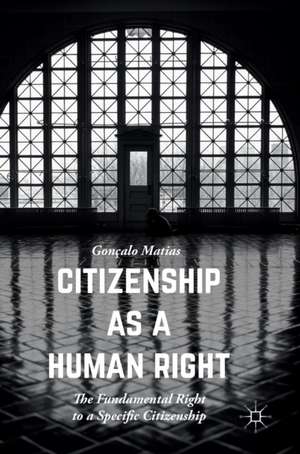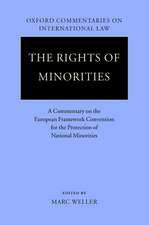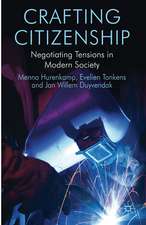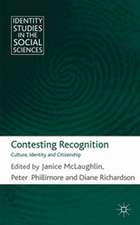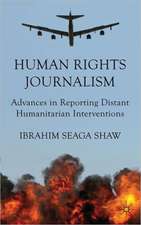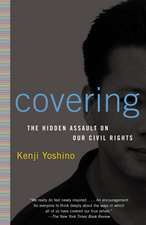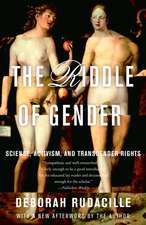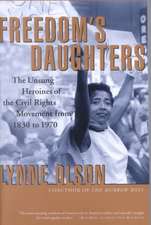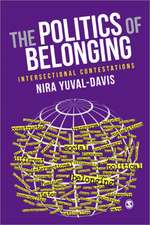Citizenship as a Human Right: The Fundamental Right to a Specific Citizenship
Autor Gonçalo Matiasen Limba Engleză Hardback – 7 iul 2016
In this innovative study based onthe basic principles of transnational citizenship law and the naturalizationpattern around the world, Matias purports that it is possible to determine thatno citizen in waiting should be permanently excluded from citizenship. Such aproposition not only imposes a positive duty overriding an important dimensionof sovereignty but it also gives rise to a discussion about undocumentedmigration. With its transnational law focus, and cases from publicinternational law courts, European courts and national courts, Citizenship as a Human Right: TheFundamental Right to a Specific Citizenship may be applied to virtuallyanywhere in the world.
| Toate formatele și edițiile | Preț | Express |
|---|---|---|
| Paperback (1) | 524.70 lei 6-8 săpt. | |
| Palgrave Macmillan UK – 7 iun 2018 | 524.70 lei 6-8 săpt. | |
| Hardback (1) | 698.94 lei 6-8 săpt. | |
| Palgrave Macmillan UK – 7 iul 2016 | 698.94 lei 6-8 săpt. |
Preț: 698.94 lei
Preț vechi: 822.29 lei
-15% Nou
Puncte Express: 1048
Preț estimativ în valută:
133.76€ • 145.24$ • 112.36£
133.76€ • 145.24$ • 112.36£
Carte tipărită la comandă
Livrare economică 23 aprilie-07 mai
Preluare comenzi: 021 569.72.76
Specificații
ISBN-13: 9781137593832
ISBN-10: 1137593830
Pagini: 257
Ilustrații: VII, 272 p.
Dimensiuni: 148 x 210 x 20 mm
Greutate: 0.48 kg
Ediția:1st ed. 2016
Editura: Palgrave Macmillan UK
Colecția Palgrave Macmillan
Locul publicării:London, United Kingdom
ISBN-10: 1137593830
Pagini: 257
Ilustrații: VII, 272 p.
Dimensiuni: 148 x 210 x 20 mm
Greutate: 0.48 kg
Ediția:1st ed. 2016
Editura: Palgrave Macmillan UK
Colecția Palgrave Macmillan
Locul publicării:London, United Kingdom
Cuprins
INTRODUCTION.-Chapter 1 – Conceptual evolution.- Chapter 2 – International law ofcitizenship.- Chapter 3 – Transnational citizenship.- Chapter 4 – EuropeanCitizenship as a form of institutional transnational citizenship.- Chapter 5 –Migrants’ rights protection and migrants as citizens in waiting.- Chapter 6 –The right to citizenship.- CONCLUSION.-REFERENCES
Notă biografică
Gonçalo Matias is the Vice Deanand Professor of Law at the Catolica School of Law where he obtained a PhD inlaw. He lectures on public law and published several articles and books oninternational migration and citizenship law. He was a Fulbright VisitingScholar at the Georgetown University Law Centre. He was Director at theMigration’s Observatory.
Textul de pe ultima copertă
This book examines a stringentproblem of current migration societies—whether or not to extend citizenship toresident migrants. Undocumented migration has been an active issue for manydecades in the USA, and became a central concern in Europe following theMediterranean migrant crisis.
In this innovative study based onthe basic principles of transnational citizenship law and the naturalizationpattern around the world, Matias purports that it is possible to determine thatno citizen in waiting should be permanently excluded from citizenship. Such aproposition not only imposes a positive duty overriding an important dimensionof sovereignty but it also gives rise to a discussion about undocumentedmigration. With its transnational law focus, and cases from publicinternational law courts, European courts and national courts, Citizenship as a Human Right: TheFundamental Right to a Specific Citizenship may be applied to virtuallyanywhere in the world.
In this innovative study based onthe basic principles of transnational citizenship law and the naturalizationpattern around the world, Matias purports that it is possible to determine thatno citizen in waiting should be permanently excluded from citizenship. Such aproposition not only imposes a positive duty overriding an important dimensionof sovereignty but it also gives rise to a discussion about undocumentedmigration. With its transnational law focus, and cases from publicinternational law courts, European courts and national courts, Citizenship as a Human Right: TheFundamental Right to a Specific Citizenship may be applied to virtuallyanywhere in the world.
